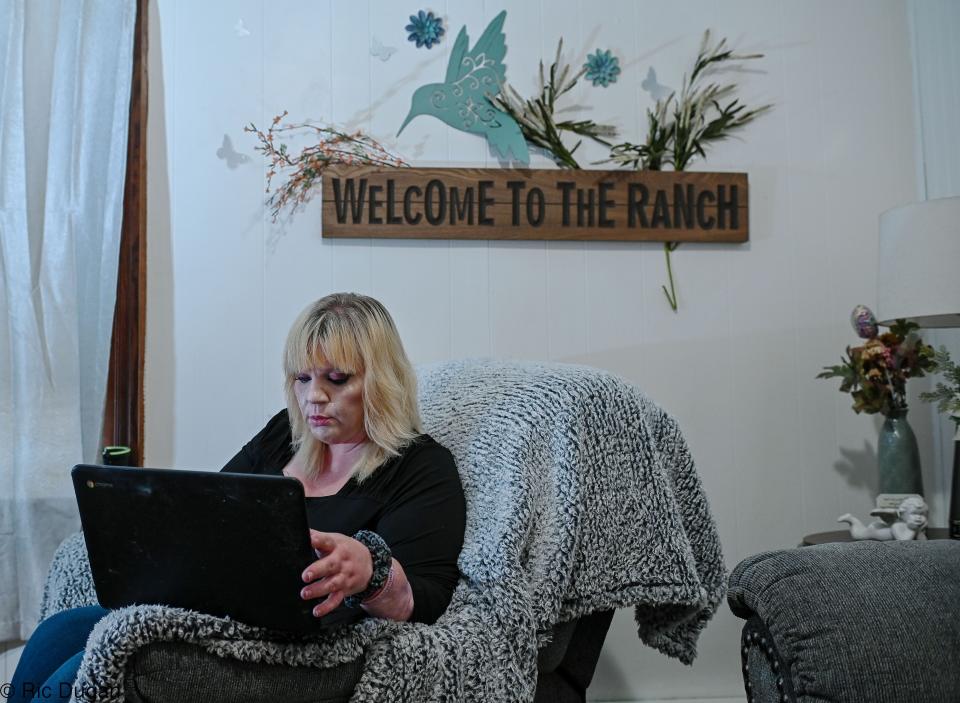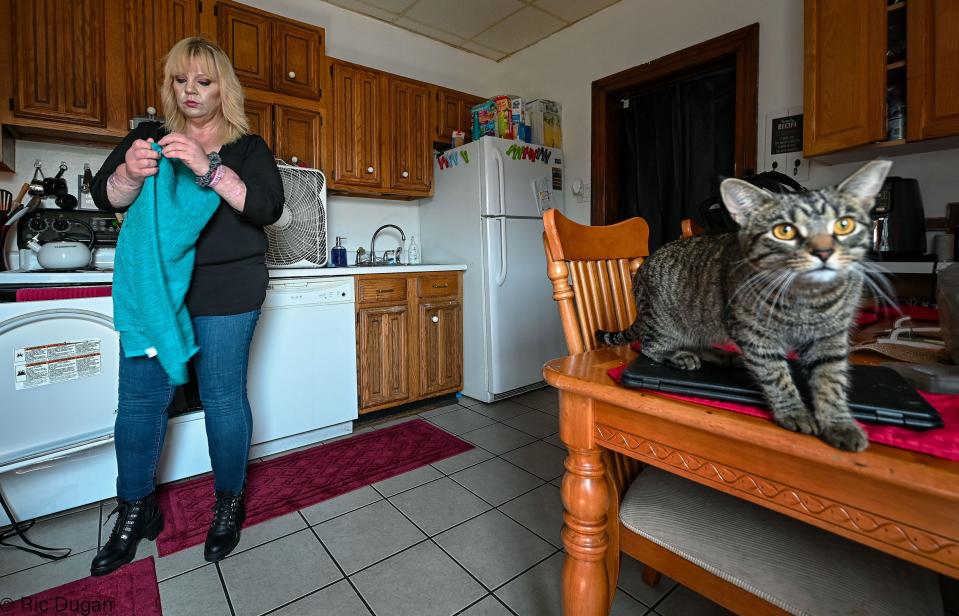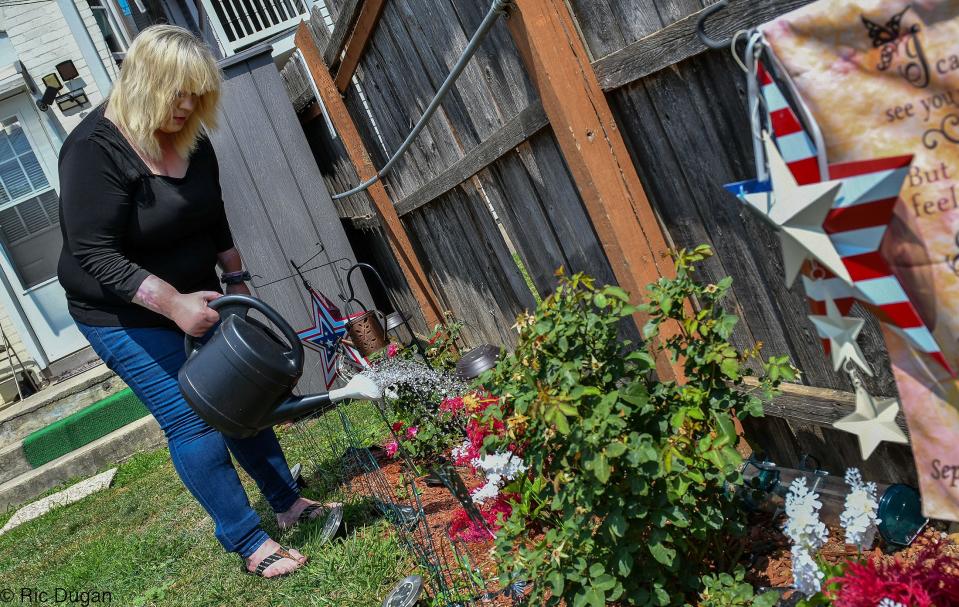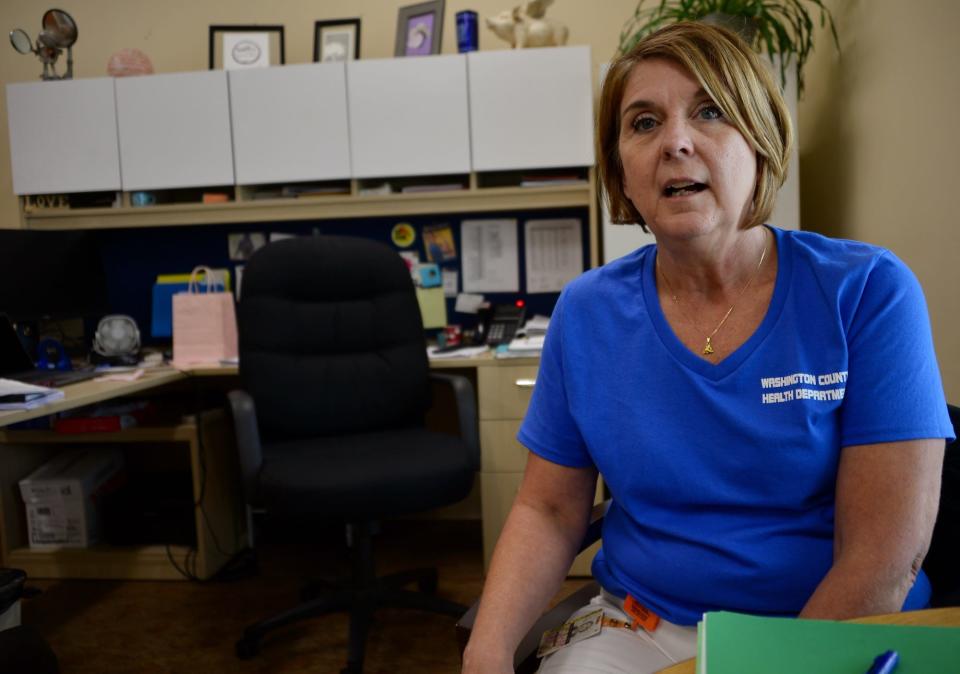A need for 'checks and balances': Quality of local sober living homes varies
Corina Drury finally started making headway in breaking her heroin addiction when the sober living home she was in along West Washington Street didn't seem much like a home at all.
She said nice furniture that was donated to the house disappeared, as well as air conditioners, TVs and a washer and dryer.
More rent money was demanded of her, even though she was paid up in advance, and some women in the home started using narcotics again in deteriorating conditions.

A Washington County Health Department official said many clients staying in sober living homes are especially vulnerable to being taken advantage of — and relapsing — because not only are they taking on the incredibly difficult task of breaking drug addiction, they often have nowhere else to go but to one of the homes.
"It was crazy. We had no heat in the winter. I mean it was awful," Drury said.
What are sober living houses?
Sober living homes, also known as recovery residences, are often part of a person's road to recovery from drug addiction. The patient may start out at a residential treatment center, which is a clinically managed facility that offers detox and crisis stabilization units, as well as a short-term or long-term rehabilitation unit.
Then the person typically steps down to other levels of care such as a recovery center, transitional facility or intensive outpatient unit. The last step is often moving to a sober living house, where clients attend addiction recovery meetings while living there. They may also have certain chores in the home, have to submit to drug testing and start work on finding a job, according to Vicki Sterling, director of behavioral health at the Washington County Health Department.
Opioid addiction battle continues: Md. Lt. Gov. Aruna Miller meets at Brooke's House to discuss addiction crisis
But while Sterling said she can take action if violations occur at certain drug treatment facilities in the county, she has limited power over certain types of sober living homes.
That's because there is a certification sober living homes can obtain through the state, but it's optional.
The certification through the Maryland Behavioral Health Administration carries certain benefits for sober living homes, such as being reimbursed by the state for the cost of housing a client during the person's first 60 days of stay, Sterling said.
But certification can be expensive due to requirements for the homes, such as so much square feet of living space per person and fire sprinkler requirements.
Who runs the houses?
On the other hand, Sterling said anyone can start a non-certified sober living home. They can have their own rules, their own programs and their own rate of rent. It can be as simple as posting something on Facebook that the home is available and the person is free to start the home, Sterling said. And if issues arise with the homes not being managed properly, Sterling said she can't do anything about it because they are not certified.
"We do have good non-certified programs. We also have poor non-certified programs," said Sterling, adding that there have been instances of managers of sober living houses misappropriating funds. House managers are often individuals who are also in addiction recovery, and sometimes they relapse while running the homes, Sterling said.
"I don't know what the answer to it is. I think it's really important to have checks and balances and that oversight. Because then, things don't happen," she said.
Sterling said the number of sober living houses in the county increased during the opioid epidemic to the point where there are more than a dozen, most of which are non-certified.
"There's also ones we don't know about," she said.
For a long time, Drury escaped the pitfalls of substance abuse that ravaged her family. She lost everyone in her immediate family to it, including her little brother who died of a drug overdose in 2020 and a little sister who died about a month later of an overdose.
"I had never been in trouble a day of my life until age 36," Drury said.
That was when she suffered a disease of the uterus. Drury said doctors performed a dozen surgeries on her as a result, and she became addicted to the opioid-based pain reliever Percocet that was prescribed to her. At one point, she couldn't find the pills so she turned to heroin because it was cheaper.

Drury said she was charged many times for drug violations, including a distribution charge when she gave a friend heroin in 2016. Drury said her friend was "begging me to help her" obtain a dose to prevent her from becoming sick due to withdrawal. Drury obtained the heroin and despite telling her friend not to do it all at once, the woman did so anyway and overdosed.
Drury was handed a 10-year prison sentence, but was eventually able to get into a drug rehab program while incarcerated. She got out of prison in 2018 but relapsed six months later. She was on the run for three years when authorities caught her in Baltimore for a parole violation. She ended up before Washington County Circuit Judge Dana Wright in September 2021.
Drury said Wright gave her another chance at recovery by sending her to the Washington County Sheriff's Office's Day Reporting Center, an on-site, nonresidential program designed to change an offender's adverse thinking patterns. Those dealing with substance addiction are among the individuals who are eligible.
Drury said the result was a "miracle" because she's been clean ever since.
Drury's sober home experience: Pay me more money or get out
After finishing her day reporting center program, Drury said she was referred to her sober living home on West Washington Street last year to continue on her transition toward recovery. She said the experience started out positive, but soon changed.
Drury said the house manager demanded Drury buy her cigarettes and gas. And if Drury refused, she was told she couldn't have guests.
Items like furniture disappearing from the house was common, Drury said, adding that a large number of Christmas presents that social service agencies donated to the house last year, for women staying there, vanished too.
Drury said the Washington County Community Action Council paid her $600 monthly rent at the home, and although she was paid up three months in advance last June, she said the house manager wanted more money from her.
More drug addiction help: 'We need to do something now': Drug counseling center seen as one way to save city
"I had no choice. It was either pay or get kicked out. She was calling all of us for more money," said Drury. She said some clients in the house relapsed, which is typical for someone dealing with the stress of breaking from a drug habit. There's that battle, then others that are stacked on top of it.
Sterling said she knows what Drury is talking about.
People living in sober living homes often have no money, and when they are released from jail, the day reporting center or other substance help programs, they have to go somewhere, Sterling said. Social service agencies sometimes temporarily pay for rent for individuals in the homes.

The sober living home they end up in may not be the best place, but it's somewhere individuals can live until they get a job and work on other parts of stabilizing their lives, Sterling said.
"You're talking about people who are vulnerable and trying to make these changes in their life. It's not an easy time," Sterling said. "A lot of people that need to go into sober living don't have the resources emotionally (or) physically. There's so much that goes on during that period to rebuild, especially if they've been using a long time. You can't just rebuild it in nine months and think that everything's perfect and rosy."
Drury said she was eventually kicked out of her sober living home. She found a good landlord in town, and with assistance from local social service agencies who helped convince the landlord to give Drury a try, she now has her own home on South Mulberry Street. It's the first time in 13 years.
Is anyone monitoring non-certified homes ?
Chase Cook, spokesperson for the Maryland Department of Health, acknowledged that neither the state health department nor county health departments have regulatory control over non-certified recovery residences.
"Because the (Maryland) Department of Health does not have authority over non-certified recovery residences, individuals with concerns regarding non-certified locations are referred to other entities in the jurisdiction who have authority over the property or issue in question," Cook said in an email. "The oversight authority and resources available to individuals in non-certified recovery residences are different in each county and depend on the type of complaint made."
Because she was attending a conference, Sterling could not be reached later to elaborate on who might have jurisdiction locally over non-certified sober living homes. But she said through an email that complaints revolving around landlord/tenant issues could be referred to local governments such as the city of Hagerstown.
Capt. Tom Langston of the Hagerstown Police Department said his agency can't regulate the homes. Such cases would typically be better suited for code enforcement to handle, but even the city's code department can't regulate sober living homes "to the degree it should be," Langston said.
Langston said sober living homes sometimes pop-up in new neighborhoods, which ends up attracting a different element that was never there before.
"That creates a lot of problems for us," Langston said.

Sterling said there have been discussions at the state and federal levels over non-certified sober living homes and the Maryland Opioid Operational Command Center has had concerns with them.
When asked about the issues, state Del. William Wivell, R-Washington, said this is the first he's heard about it.
Youth violence help: Teen dropout, pregnancy rates get closer look in youth violence prevention effort
"No one's ever come to our office about it," Wivell said. Perhaps the issues can be resolved by a combination of state legislation and county land-use laws, he said.
If public health officials want action, it would be helpful if they outline the problems to the local delegation when they hold public input sessions locally before the start of the Maryland General Assembly at the beginning of the year, Wivell said.
'A lot of sharks out there in the water'
State Sen. Paul Corderman, R-Washington, also said this is the first time he's heard about the issue. Corderman agreed that perhaps the best way to regulate sober living houses is through local land-use laws, also referred to as zoning. He said if there are problems in the way some sober living houses are operated, "there's something that needs to be done about that."
Kevin Simmers, who runs Brooke's House, a women's addiction recovery program started in memory of his daughter Brooke, who died of a drug overdose in 2015, said he has transition properties that his clients lease as they're coming out of treatment.
Simmers said he has never had any trouble in his transition properties and any issues are dealt with promptly. He declined to comment about whether more regulation is needed for sober living houses, saying that's a question more for other health professionals.
"But there's a lot of sharks out there in the water, no doubt about it," Simmers said.
This article originally appeared on The Herald-Mail: Sober living homes draw concern over quality in Washington County

